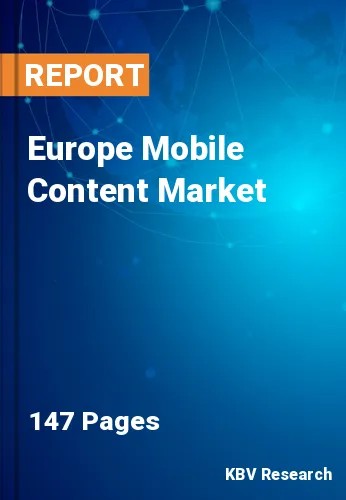Chapter 1. Market Scope & Methodology
1.1 Market Definition
1.2 Objectives
1.3 Market Scope
1.4 Segmentation
1.4.1 Europe Mobile Content Market, by Content Type
1.4.2 Europe Mobile Content Market, by Platform
1.4.3 Europe Mobile Content Market, by Revenue Model
1.4.4 Europe Mobile Content Market, by Country
1.5 Methodology for the research
Chapter 2. Market at a Glance
2.1 Key Highlights
Chapter 3. Market Overview
3.1 Introduction
3.1.1 Overview
3.1.1.1 Market Composition and Scenario
3.2 Key Factors Impacting the Market
3.2.1 Market Drivers
3.2.2 Market Restraints
3.2.3 Market Opportunities
3.2.4 Market Challenges
Chapter 4. Competition Analysis - Global
4.1 KBV Cardinal Matrix
4.2 Recent Industry Wide Strategic Developments
4.2.1 Partnerships, Collaborations and Agreements
4.2.2 Product Launches and Product Expansions
4.2.3 Acquisition and Mergers
4.3 Market Share Analysis, 2023
4.4 Top Winning Strategies
4.4.1 Key Leading Strategies: Percentage Distribution (2020-2024)
4.4.2 Key Strategic Move: (Partnerships, Collaborations and Agreements: 2023, Apr – 2024, Sep) Leading Players
4.5 Porter Five Forces Analysis
Chapter 5. Europe Mobile Content Market by Content Type
5.1 Europe Games Market by Country
5.2 Europe Mobile Apps Market by Country
5.3 Europe Music Market by Country
5.4 Europe Other Content Type Market by Country
Chapter 6. Europe Mobile Content Market by Platform
6.1 Europe Android Market by Country
6.2 Europe iOS Market by Country
6.3 Europe Other Platform Market by Country
Chapter 7. Europe Mobile Content Market by Revenue Model
7.1 Europe In-App Purchases Market by Country
7.2 Europe Advertising Market by Country
7.3 Europe Subscription Market by Country
7.4 Europe Pay-per-Downloads Market by Country
7.5 Europe Other Revenue Model Market by Country
Chapter 8. Europe Mobile Content Market by Country
8.1 Germany Mobile Content Market
8.1.1 Germany Mobile Content Market by Content Type
8.1.2 Germany Mobile Content Market by Platform
8.1.3 Germany Mobile Content Market by Revenue Model
8.2 UK Mobile Content Market
8.2.1 UK Mobile Content Market by Content Type
8.2.2 UK Mobile Content Market by Platform
8.2.3 UK Mobile Content Market by Revenue Model
8.3 France Mobile Content Market
8.3.1 France Mobile Content Market by Content Type
8.3.2 France Mobile Content Market by Platform
8.3.3 France Mobile Content Market by Revenue Model
8.4 Russia Mobile Content Market
8.4.1 Russia Mobile Content Market by Content Type
8.4.2 Russia Mobile Content Market by Platform
8.4.3 Russia Mobile Content Market by Revenue Model
8.5 Spain Mobile Content Market
8.5.1 Spain Mobile Content Market by Content Type
8.5.2 Spain Mobile Content Market by Platform
8.5.3 Spain Mobile Content Market by Revenue Model
8.6 Italy Mobile Content Market
8.6.1 Italy Mobile Content Market by Content Type
8.6.2 Italy Mobile Content Market by Platform
8.6.3 Italy Mobile Content Market by Revenue Model
8.7 Rest of Europe Mobile Content Market
8.7.1 Rest of Europe Mobile Content Market by Content Type
8.7.2 Rest of Europe Mobile Content Market by Platform
8.7.3 Rest of Europe Mobile Content Market by Revenue Model
Chapter 9. Company Profiles
9.1 Google LLC (Alphabet Inc.)
9.1.1 Company Overview
9.1.2 Financial Analysis
9.1.3 Segmental and Regional Analysis
9.1.4 Research & Development Expense
9.1.5 Recent strategies and developments:
9.1.5.1 Partnerships, Collaborations, and Agreements:
9.1.5.2 Product Launches and Product Expansions:
9.1.6 SWOT Analysis
9.2 Microsoft Corporation
9.2.1 Company Overview
9.2.2 Financial Analysis
9.2.3 Segmental and Regional Analysis
9.2.4 Research & Development Expenses
9.2.5 Recent strategies and developments:
9.2.5.1 Product Launches and Product Expansions:
9.2.5.2 Acquisition and Mergers:
9.2.6 SWOT Analysis
9.3 Meta Platforms, Inc.
9.3.1 Company Overview
9.3.2 Financial Analysis
9.3.3 Segment and Regional Analysis
9.3.4 Research & Development Expense
9.3.5 Recent strategies and developments:
9.3.5.1 Partnerships, Collaborations, and Agreements:
9.3.5.2 Product Launches and Product Expansions:
9.3.6 SWOT Analysis
9.4 Sony Corporation
9.4.1 Company Overview
9.4.2 Financial Analysis
9.4.3 Segmental and Regional Analysis
9.4.4 Research & Development Expenses
9.4.5 Recent strategies and developments:
9.4.5.1 Partnerships, Collaborations, and Agreements:
9.4.6 SWOT Analysis
9.5 Apple, Inc.
9.5.1 Company Overview
9.5.2 Financial Analysis
9.5.3 Regional Analysis
9.5.4 Research & Development Expense
9.5.5 Recent strategies and developments:
9.5.5.1 Partnerships, Collaborations, and Agreements:
9.5.6 SWOT Analysis
9.6 Huawei Technologies Co., Ltd. (Huawei Investment & Holding Co., Ltd.)
9.6.1 Company Overview
9.6.2 Financial Analysis
9.6.3 Segmental and Regional Analysis
9.6.4 Research & Development Expenses
9.6.5 Recent strategies and developments:
9.6.5.1 Partnerships, Collaborations, and Agreements:
9.6.6 SWOT Analysis
9.7 Nintendo Co., Ltd.
9.7.1 Company Overview
9.7.2 Financial Analysis
9.7.3 Regional Analysis
9.7.4 Research & Development Expenses
9.7.5 Recent strategies and developments:
9.7.5.1 Partnerships, Collaborations, and Agreements:
9.7.5.2 Acquisition and Mergers:
9.7.6 SWOT Analysis
9.8 Amazon.com, Inc.
9.8.1 Company Overview
9.8.2 Financial Analysis
9.8.3 Segmental Analysis
9.8.4 Recent strategies and developments:
9.8.4.1 Product Launches and Product Expansions:
9.8.4.2 Acquisition and Mergers:
9.8.5 SWOT Analysis
9.9 ByteDance Ltd.
9.9.1 Company Overview
9.9.2 Recent strategies and developments:
9.9.2.1 Partnerships, Collaborations, and Agreements:
9.9.2.2 Acquisition and Mergers:
9.9.3 SWOT Analysis
9.10. Samsung Electronics Co., Ltd. (Samsung Group)
9.10.1 Company Overview
9.10.2 Financial Analysis
9.10.3 Segmental and Regional Analysis
9.10.4 Research & Development Expenses
9.10.5 SWOT Analysis

